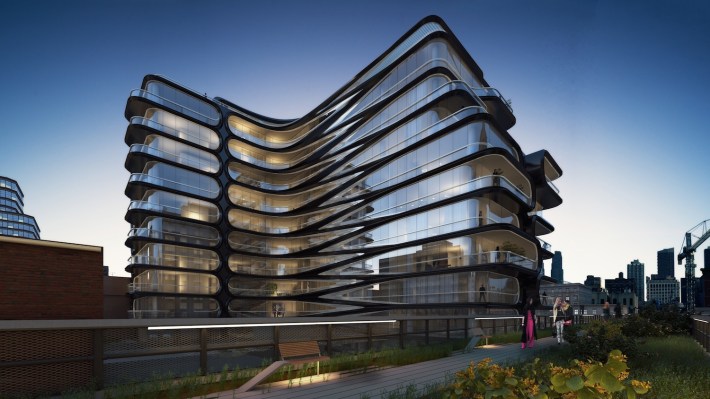For years, the City Planning Commission approved special permits that let developers in Hell's Kitchen and Chelsea get around limits on parking construction in the Manhattan core. Recently, the city implemented a new formula that reformers hoped would curtail these permits. But Community Board 4, Council Member Corey Johnson, and Borough President Gale Brewer say the city's math is flawed, resulting in too much new parking. They're asking the Department of City Planning to come up with a better measuring stick.

Since 1982, new buildings south of West 110th Street and East 96th Street have been subject to parking maximums established in response to the Clean Air Act.
But in practice, the city allows exceptions. If developers want to build more parking than allowed, they can apply for a special permit. For a long time, the city reflexively granted these permits for new buildings on the West Side, leading to the addition of thousands of parking spaces that otherwise wouldn't have been built.
Then the city revised its Manhattan parking regulations in 2013, with DCP issuing new guidelines for developers looking for exemptions from parking maximums [PDF]. Has the new policy made a difference? Apparently not.
The city now requires developers seeking special permits to measure trends in the area over the past decade, by calculating changes in the number of residences and parking spaces within one-third of a mile of the project. Echoing the parking maximums in the law, DCP aims for there to be 20 percent as many new parking spaces as there are new apartments south of 59th Street. On the Upper East Side and Upper West Side, the ratio is 35 percent.
If the extra spaces being requested push that ratio above the target, it's likely the permit will be denied. If the ratio stays below the target, the city is likely to approve the permit.
It sounds scientific, but by only looking at new development and new parking, DCP rigs the game.
For years, neighborhoods like Hell's Kitchen and West Chelsea had lots of extra parking but little new residential development. In the past decade, that's changed. As a result, City Planning's numbers show the number of new apartments far outpacing the supply of new parking spaces. This opens the door for lots of special permits to get the parking ratio up to the department's 20 percent target, but ignores the fact that the neighborhood had lots of parking to begin with.
“They are missing a very fundamental element of the calculation," said CB 4 Chair Christine Berthet. "It’s broken. It clearly doesn’t work."
Over the past year, developers have filed a series of permit applications, often to build private high-end parking spots for luxury apartments. Since these parking spots qualify under DCP's new rules, the permits have gotten the green light.
While each project may be small on its own, in the aggregate they add up to a lot more parking -- and more driving and traffic.
On Wednesday, CB 4 voted against its latest permit request in a 29-3 vote on a project at 530 W. 28th Street [PDF]. The building, with 36 apartments plus commercial space, would normally be allowed 10 parking spaces. The developer is looking for a special permit to allow 39 parking spaces in an automated garage, almost four times the normal limit.
"This is one space per unit," said CB 4 member David Holowka. "If we kept allowing that, we’d end up with 100 percent, rather than the 20 percent target."
The project is next door to yet another development receiving a special permit for extra parking. That building, led by the Related Companies and designed by Pritzker Prize-winning architect Zaha Hadid, is at 520 W. 28th Street, next to the High Line. The building, containing 40 condominiums and ground-floor retail, is allowed up to 11 parking spaces under the city's zoning rules. The developer applied for a special permit to allow 29 parking spaces [PDF].
At its April meeting, CB 4 voted against the request in a 33-3 vote. Three months later, the City Planning Commission voted to allow it.
“It’s out of control. There’s too much parking," said Johnson, who noted that developers in his district almost always meet the requirements for a special permit. “When an applicant meets the findings, by law we can’t be turning them down, so that’s why we need City Planning to revise the actual guidelines."
So far, DCP has made only minor tweaks. It now prevents two projects in the same area from failing to account for each other, and posts parking counts online so community groups and elected officials can crunch numbers alongside the developer.
DCP needs to adopt a much more thorough overhaul, say CB 4, Johnson, and Borough President Gale Brewer. "In some study areas the supply of parking prior to the ten year look-back period render the residential growth study meaningless," Brewer wrote in comments on the permit application for the Zaha Hadid building [PDF].
The department could look at more than just the past 10 years of parking. It could also measure transit access, parking vacancy rates, and better distinguish between public and "accessory" parking that's supposed to be reserved for building occupants.
"The review process itself needs to be robust enough to fully evaluate new parking," Brewer wrote. "DCP should continue its encouraging work of improving the special permit application guidelines for these special permits to take into account a more robust set of factors."





